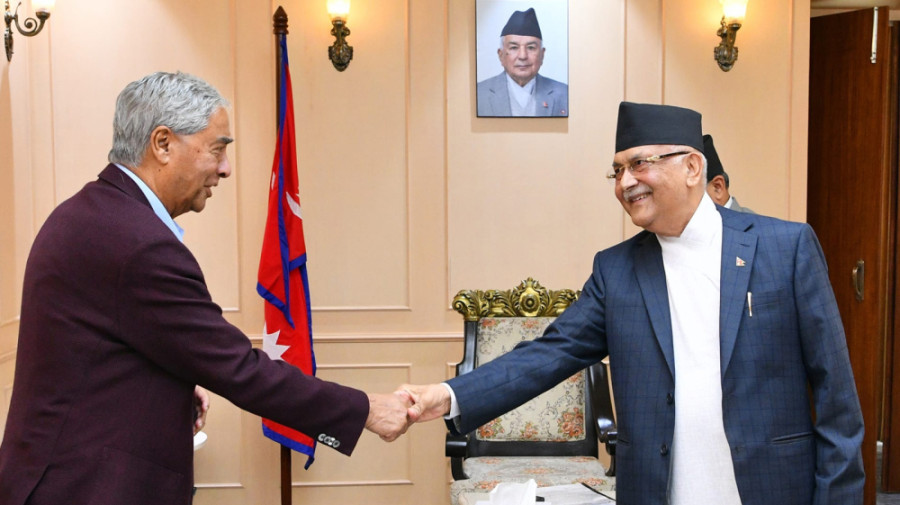Politics
Coalition’s constitution amendment agenda appears to be in limbo
Political analyst says Congress-UML combine used amendment agenda to gain power without commitment for reform.
Purushottam Poudel
Amending the constitution was a key promise of the seven-point agreement signed between Nepal’s two largest political parties, the Nepali Congress and CPN-UML, in early July while forming the government led by KP Sharma Oli. But almost six months on, this ambitious promise remains unfulfilled.
Earlier in September, the ruling coalition parties agreed to hold extensive discussions about amending the constitution. The parties said that the amendment process would only proceed after consulting key political parties and stakeholders.
Three months after such an agreement, Congress General Secretary Gagan Thapa, speaking at a party function in Kathmandu on Sunday, said a mechanism to amend the constitution would be formed within a few days. Thapa also added that the mechanism would be pragmatic and that amendments would be made cautiously.
“The debate on amending the constitution has begun,” Thapa said, ‘Within a few days, Congress and UML will form a mechanism. We will handle this cautiously since there is no room for adventures. We will also have a dialogue with other political parties.”
He said that the constitution cannot be amended just because Congress and UML want it. It will be done only after a broad understanding among the Maoist, Madhesi and other political parties.
“After reaching an agreement with all parties and stakeholders, we will amend only the minimum provisions to ensure the smooth functioning of the constitution,” Thapa said.
“We must create a situation where one political party can run the government for a period. There are some other issues we would like to address through amendments, which will be made with caution,” Thapa added.
A fractured election mandate has resulted in political instability at both federal and provincial levels, and calls have grown for constitutional revision to reform the current electoral system.
However, leaders of the ruling parties have expressed seemingly differing views regarding the amendment process and the formation of the mechanism. While Congress General Secretary Thapa stressed the need for forming a mechanism within a few days, UML chief whip Mahesh Bartaula said they are still discussing the structure of the mechanism.
Similarly, speaking in Dang on December 8, UML General Secretary Shankar Pokharel had said the amendment of the constitution would only start after the election to the National Assembly, which is a year and a half away.
“Our leadership wants consensus among all parties for revising the constitution,” Bartaula told the Post. “However, we have yet to discuss the structure of the mechanism and the nitty gritty of the amendment.”
General Secretary Pokharel said the ruling parties do not have two-thirds majority in the National Assembly so the agenda of amending the constitution cannot move forward until they have the required majority in the upper house.”
At present, the ruling coalition cannot win the support of the CPN (Maoist Centre) on the issue of amending the constitution, therefore, amendment will be possible only after the power equation in the upper house shifts after its next election, Pokharel argued. Maoist Centre has seen the agreement between Congress and UML to amend the constitution with suspicion.
Although the ruling coalition has a two-thirds majority in the House of Representatives, it falls short in the National Assembly. The Congress-UML needs the support of at least 40 members in the 59-member upper house. While the Congress commands the seats of 16, UML has 10 members in the Upper House, which makes the coalition short of 14 lawmakers for the two-thirds majority. The Maoist Centre is the largest party in the upper house with 17 seats, and the coalition partners will need the support of all other political parties in the National Assembly if Maoist Centre refuses to pass any amendment.
One-third of the National Assembly's members are elected every two years. The last election was in January; the next will be in January 2026 if the Congress-UML coalition survives until then. And even in a best-case scenario, where the two parties won all one-third of the seats up for grabs, they would only win 19 out of the 59-member assembly.
Currently, the Congress-UML has 26 seats in the National Assembly. When one-third of the seats are vacant, the number of seats for both parties will also decrease. This means the coalition is not guaranteed to reach a comfortable two-thirds majority without the support of other fringe parties even after the next National Assembly election. What then?
Political experts, therefore, believe that numerical strength alone won’t work. The constitution can be amended if the two ruling parties with a strong majority in the House of Representatives intend to do so.
Congress and UML indeed have a strong majority in the House. With a few smaller forces backing, they can manage the two-thirds majority needed to amend the constitution,” Professor of Political Science Krishna Khanal said in the latest interview with the Post. “However, when it comes to political issues, even the small parties in the coalition are hardly on the same page. So, numerical strength alone won’t work.”
He further says the constitutional amendment has not progressed in the past five months because the political parties have used it to get to power without genuine commitment to reform.




 11.12°C Kathmandu
11.12°C Kathmandu















